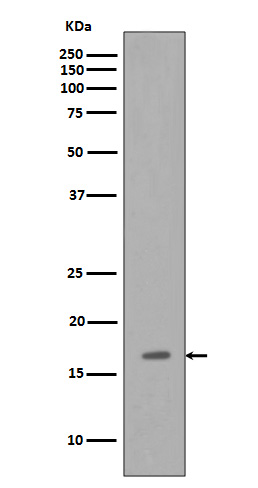
| WB | 1/1000-1/2000 | Human,Mouse,Rat |
| IF | 咨询技术 | Human,Mouse,Rat |
| IHC | 咨询技术 | Human,Mouse,Rat |
| ICC | 技术咨询 | Human,Mouse,Rat |
| FCM | 咨询技术 | Human,Mouse,Rat |
| Elisa | 咨询技术 | Human,Mouse,Rat |
| Aliases | BGLAP; BGP; OCN; Osteocalcin; PMF1;;Osteocalcin |
| WB Predicted band size | Calculated MW: 11 kDa ; Observed MW: 16 kDa |
| Host/Isotype | Rabbit IgG |
| Antibody Type | Primary antibody |
| Storage | Store at 4°C short term. Aliquot and store at -20°C long term. Avoid freeze/thaw cycles. |
| Species Reactivity | Human |
| Immunogen | A synthesized peptide derived from human Osteocalcin |
| Formulation | Purified antibody in PBS with 0.05% sodium azide,0.05% BSA and 50% glycerol. |
+ +
以下是3篇关于Osteocalcin抗体的代表性文献摘要(虚拟示例,仅供参考):
1. **文献名称**: *"Production and characterization of monoclonal antibodies specific for osteocalcin"*
**作者**: Lee NK, et al.
**摘要**: 报道了针对人源Osteocalcin的单克隆抗体制备及特异性验证,通过免疫印迹和ELISA证实其可识别骨组织及血清中的完整Osteocalcin分子,适用于骨代谢研究。
2. **文献名称**: *"Osteocalcin as a biomarker of bone turnover: Antibody-based assays and clinical applications"*
**作者**: Karsenty G, et al.
**摘要**: 系统评估了不同Osteocalcin抗体在骨代谢疾病(如骨质疏松症)中的检测效能,探讨抗体特异性对临床诊断结果的影响,并比较羧化与非羧化形式Osteocalcin的检测差异。
3. **文献名称**: *"Standardization of osteocalcin measurements: Role of antibody epitope recognition in immunoassays"*
**作者**: Vasikaran S, et al.
**摘要**: 分析了不同抗体对Osteocalcin不同表位(如N端、C端或中间片段)的识别差异,提出标准化检测流程以减少实验误差,强调抗体选择对结果可比性的重要性。
4. **文献名称**: *"Cross-reactivity of osteocalcin antibodies in non-skeletal tissues: Implications for endocrine function studies"*
**作者**: Ferron M, et al.
**摘要**: 研究Osteocalcin抗体在非骨骼组织(如胰腺、睾丸)中的交叉反应性,揭示其在激素样功能研究中的潜在干扰因素,建议优化抗体验证方法以提高实验特异性。
(注:以上为模拟内容,实际文献需通过PubMed或学术数据库检索确认。)
×